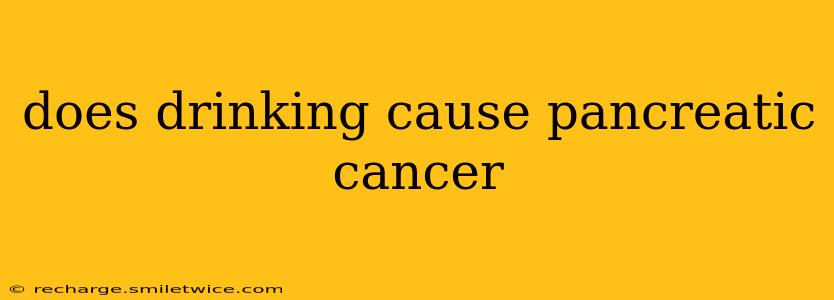Pancreatic cancer is a devastating disease with a notoriously poor prognosis. While the exact causes remain complex and multifaceted, a strong link exists between alcohol consumption and the increased risk of developing this deadly cancer. This article delves into the relationship between alcohol and pancreatic cancer, exploring the extent of the risk, the underlying mechanisms, and what individuals can do to mitigate their chances.
How Strong is the Link Between Alcohol and Pancreatic Cancer?
Numerous studies have consistently demonstrated a positive correlation between alcohol consumption and the risk of pancreatic cancer. The more alcohol a person consumes, the higher their risk becomes. This isn't simply a matter of correlation; research suggests a causal relationship. Even moderate drinking increases the risk, though the risk escalates significantly with heavier consumption. The type of alcoholic beverage also plays a role, with some studies suggesting that spirits may be particularly strongly linked to increased risk.
What are the Mechanisms Behind the Link?
The exact mechanisms through which alcohol contributes to pancreatic cancer aren't fully understood, but several factors are believed to be involved:
- Acetaldehyde: Alcohol is metabolized in the body to produce acetaldehyde, a known carcinogen. This toxic substance can damage DNA and contribute to the development of cancerous cells in the pancreas.
- Chronic Inflammation: Excessive alcohol consumption can lead to chronic inflammation in the pancreas. This persistent inflammation creates an environment conducive to the growth of cancerous cells.
- Nutritional Deficiencies: Heavy drinking often leads to nutritional deficiencies, including deficiencies in crucial vitamins and minerals that play a role in maintaining healthy pancreatic function and preventing cancer development.
- Increased Risk of Other Pancreatic Conditions: Alcohol abuse significantly increases the risk of pancreatitis, an inflammation of the pancreas. Chronic pancreatitis is a known risk factor for pancreatic cancer.
Does the Type of Alcohol Matter?
While more research is needed to definitively rank alcoholic beverages by their impact, some evidence suggests that spirits (hard liquor) may carry a higher risk than beer or wine. This could be due to the higher alcohol concentration in spirits. However, any type of alcohol consumption increases the risk to some degree. Moderation is key across all types of alcohol.
What about Moderate Drinking? Does it Still Increase Risk?
Yes, even moderate drinking increases the risk of pancreatic cancer, although the increase is less pronounced than with heavy drinking. "Moderate" is defined differently across studies, but it generally refers to a level below the recommended daily limits. While the risk may be lower with moderate consumption, it's still a risk, and completely abstaining from alcohol is always the safest option.
Can I Reduce My Risk if I Already Drink?
If you currently drink alcohol, reducing your intake significantly or abstaining completely can help reduce your risk of pancreatic cancer. Making healthy lifestyle choices, such as maintaining a balanced diet, regular exercise, and avoiding smoking, further minimizes the risk.
What other factors increase the risk of pancreatic cancer?
Several other factors increase the risk of pancreatic cancer, including:
- Smoking: Smoking is a major risk factor for pancreatic cancer, significantly increasing the risk, even independently of alcohol consumption.
- Family History: A family history of pancreatic cancer increases an individual's risk considerably.
- Age: Risk increases with age.
- Diabetes: People with diabetes have a higher risk of developing pancreatic cancer.
- Obesity: Obesity is linked to an increased risk.
- Race/Ethnicity: Certain racial and ethnic groups have a higher incidence of pancreatic cancer.
Conclusion
The evidence strongly suggests a link between alcohol consumption and pancreatic cancer. While the exact mechanisms are still being investigated, reducing or eliminating alcohol intake is a crucial step in lowering your risk. Combining this with other healthy lifestyle choices can provide the best defense against this aggressive disease. Always consult with a healthcare professional for personalized advice.
